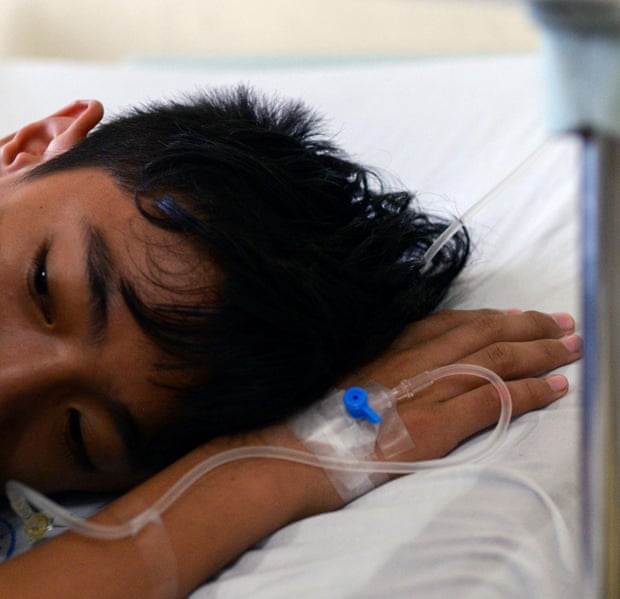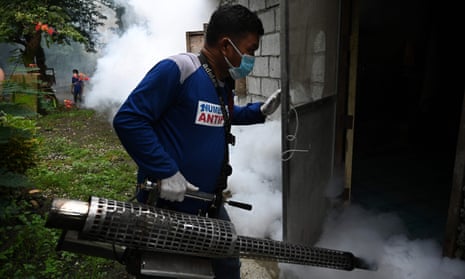The Philippine health ministry has urged local officials to ramp up efforts to combat dengue fever after the death toll from the epidemic reached 1,021.
The young have born the brunt of the outbreak, with children under the age of 10 accounting for more than a third of the deaths recorded in the eight months up to August, when a national epidemic of the mosquito-borne disease was declared.
Health undersecretary Rolando Enrique Domingo, who said 13,192 new cases and 38 deaths have been recorded since 18 August, called on local governments to do more to find and destroy mosquito breeding sites.
“What we need [to do] is to go down to the village level,” he said. “It also needs to be done daily.
“We understand that sometimes it may be tiring, but the threat of dengue is continuous. We ask for a little more effort because as we can see there are still a lot of cases.”
Domingo recommended insecticide fogging, especially in areas where cases have risen, and advised people to wear insect repellent and clothes that cover the skin.
The government fears cases could rise further as the country enters typhoon season.
Following a national ban on a controversial vaccine blamed for children’s deaths, cases of dengue fever in the Philippines have more than doubled compared with figures for the same period last year.
The Department for Health has recorded 249,332 cases since the start of the year, dwarfing the 119,224 cases recorded in 2018. The figures are the highest since 2012.
Quick GuideDengue fever in the Philippines
Show

What is dengue fever?
Dengue fever is a mosquito-borne viral infection found in tropical countries worldwide. It can lead to haemorrhaging and organ failure in severe cases, and there is no specific treatment for the illness.
Children are often worst hit: in the Philippines, children under 10 account for more than a third of deaths caused by the disease.
The virus thrives in areas of rapid urbanisation with poor sanitation.
Why have cases of dengue fever risen so dramatically?
The epidemic follows a national ban on a controversial vaccine in February 2019.
Dengvaxia is currently the only dengue vaccination available, but the company that makes it – French pharmaceutical firm Sanofi Pasteur – was at the heart of a scandal in the Philippines in 2017–2018. Dozens of children died after being given the vaccine as part of a nationwide immunisation programme. The firm conceded that the product could put some children at higher risk.
There are fears that the death toll could rise further as the country enters typhoon season.
What is being done to curb the epidemic?
Guidelines have been issued suggesting people wear insect repellent and wear clothes that cover the skin, and the Department of Health has said it is working to find and destroy mosquito breeding sites.
Insecticide fogging is being used to try to reduce mosquito numbers in areas with a high number of cases.
The government is considering lifting the ban on Dengvaxia, but widespread mistrust of vaccines following the scandal could impact uptake were a vaccination programme to be reintroduced.
The World Health Organization recommends that Dengvaxia should only be given to those in high-risk areas who have already been exposed to the virus.
The government is considering appeals to lift its ban on Dengvaxia, a drug developed by French pharmaceutical firm Sanofi Pasteur that remains the only vaccine available against dengue. However, many remain cautious due to claims that improper use in the country had led to children’s deaths. The World Health Organization issued a conditional recommendation for the vaccine in areas where dengue is highly endemic.
The Dengvaxia scandal has caused a widespread vaccine scare in the Philippines, resulting in increased cases of dengue and measles. There is growing concern that polio could also return to the country for the first time since 1993.
While the epidemic has already prompted some villages to double down against dengue, some efforts appear to have been misguided. In Quezon City, a village chief reportedly released hundreds of frogs into drainage canals in a bid to fight dengue, only to realise that the frogs were invasive species that could disrupt the environment.
Dengue, a viral infection, is widespread throughout the tropics. The virus thrives in areas of rapid urbanisation, poor sanitation and the absence of a vaccine.
The Department of Health has warned parents to monitor their children for fever accompanied by severe headache, pain behind the eyes or muscle and joint pain lasting two days or more. Dengue can lead to haemorrhaging and organ failure in severe cases.
Dengue is not confined to specific regions, although the highest number of cases have been recorded in Western Visayas (42,694 cases) and southern Luzon (35,136 cases). Metropolitan Manila reported 15,819 cases.
Esperanza Cabral, the former health secretary, told the Guardian that government efforts will never be enough until the ban on Dengvaxia vaccine is lifted.
Cabral said: “The government has focused its campaign on reducing the number of mosquitoes and on cleanliness. Doing just that will not work. We know there’s a vaccine that is not perfect but is effective enough. Unfortunately, it is not available.”
Cabral added that the government should work harder to restore public confidence in vaccines. “We need to prevent the next epidemic,” he said.
